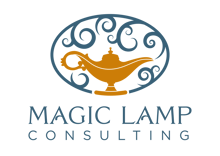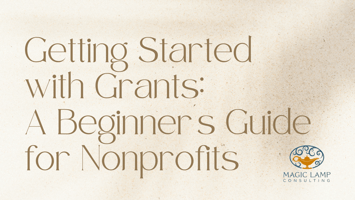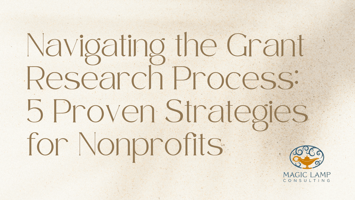Grant funding can be a game-changer for nonprofits looking to expand their impact and sustain their...
Why Understanding Your Needs Before Applying for Grants Improves Funding Odds

In the ever-competitive landscape of grant applications, securing funding can sometimes feel like navigating a maze blindfolded. Nonprofits often find themselves grappling with the challenge of securing the financial support they need to bring their missions and visions to fruition. While the allure of grants is undeniable, accessing funding needs before diving into the application process can significantly improve the odds of success. Together, the Magic Lamp Consulting team has created three compelling reasons why this approach is crucial for your success:
Strategic Alignment and Targeted Applications:
One of the most common pitfalls in grant applications is submitting proposals that lack alignment with the funding organization's priorities. Without a clear understanding of their own financial needs and how they intersect with the goals of potential funders, applicants risk wasting time and resources on applications that are unlikely to succeed.
By first assessing their funding needs, organizations can identify projects and initiatives that align closely with the mission and priorities of potential funders. This strategic alignment increases the relevance of the proposed project, making it more compelling to grant reviewers. Moreover, targeted applications demonstrate to funders that the organization has done its homework, increasing credibility and trust in the applicant's ability to effectively utilize the funds.
For example, a nonprofit focused on environmental conservation may identify a need for funding to launch an educational outreach program in underserved communities. By researching grant opportunities and assessing their funding needs, the organization can identify foundations or government agencies that prioritize environmental education and target their applications accordingly. This targeted approach significantly enhances the likelihood of securing funding.
Resource Optimization and Budget Planning:
Understanding funding needs before applying for grants enables organizations to develop realistic budgets and allocate resources effectively. Without a clear understanding of the financial requirements of a project or program, organizations may underestimate costs or overlook critical expenses, leading to budgetary gaps or funding shortfalls down the line.
By conducting a comprehensive assessment of funding needs, organizations can accurately estimate the resources required to implement their proposed projects. This includes not only direct project costs but also overhead expenses, personnel salaries, and any other ancillary costs associated with project execution. Armed with this information, organizations can develop detailed budgets that reflect the true cost of their initiatives, increasing transparency and accountability in grant applications.
Additionally, understanding funding needs allows organizations to prioritize their resource allocation efforts effectively. Rather than pursuing funding opportunities indiscriminately, organizations can focus their efforts on grants that align closely with their financial requirements and strategic objectives. This targeted approach maximizes the return on investment in grant-seeking activities, ensuring that organizations devote their time and resources to opportunities with the greatest potential for success.
Enhanced Grant Readiness and Competitiveness:
Grant reviewers are tasked with evaluating numerous applications, often under tight deadlines. In this competitive landscape, applications that demonstrate a clear understanding of funding needs and project feasibility stand out from the crowd. Organizations that have taken the time to assess their financial requirements and develop robust project plans are perceived as more prepared and credible by grant reviewers.
Moreover, understanding funding needs enables organizations to proactively address potential concerns or questions that may arise during the review process. By anticipating and preemptively addressing potential objections, applicants can strengthen their proposals and mitigate perceived risks, thereby enhancing their competitiveness in the grant selection process.
Ultimately, accessing funding needs before applying for grants enhances an organization's grant readiness and competitiveness, increasing the likelihood of securing funding to support its mission and objectives.




